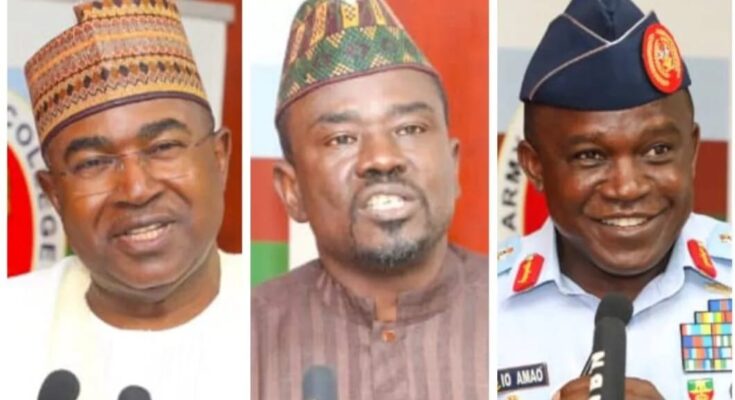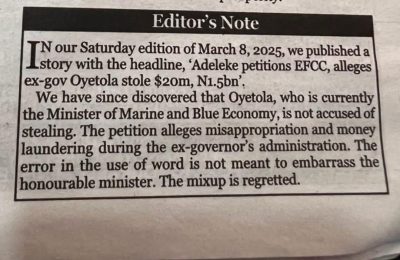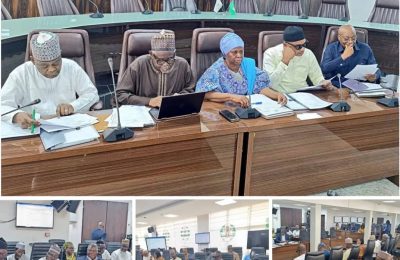
By Yushau A. Shuaib
Air Vice Marshall Sayo Olatunde, the Commandant of the Nigerian Airforce War College, Makurdi, Benue State, is an excellent host any time I am in the college as a guest lecturer on crisis communication and social media engagement.

We often discuss extensively on contemporary issues on the hard and soft power policies of the military, as well as the place of the media in psychological operations.
In October, he requested me to review his new book, “Analytical Frameworks for Applying Critical Thinking To Operational Planning and Resolving Insurgency With Net Assessment.” Since I am a writer, I gladly accepted to write and have the press publish a critique of his very crucial and significant intellectual intervention to the rooting out of a debilitating national malaise.
A multiple award-wining officer, AVM Olatunde is a member of 39 Regular Courses of the Nigerian Defence Academy (NDA), and he holds a First Class Bachelor of Science degree in Chemistry. His Master’s is in Public and International Affairs from the University of Lagos. He started out as an engineering officer before becoming a pilot in the Nigerian Air Force (NAF).
This amiable engineer-cum-fighter pilot is very passionate about the utilisation of net assessment in counterinsurgency strategy and operations. Although the notion of net assessment could sound like an economic, financial or political term, it is actually the comparative analysis of military, technological, political, economic, and other factors governing the relative military capability of nations.
The purpose of net assessment is to identify problems and opportunities that deserve the attention of senior defence officials. In seeking to contain insurgency through net assessment, Olatunde recommends associated analytical tools with a view to promoting anticipatory rather than reactive operational planning and management in the Armed Forces of Nigeria, as a vital anchor of counterinsurgency operations.
A few weeks after our discussion, I received a copy of the War College commandant’s book, whose Foreword was written by the Defence Minister, Major-General Bashir Salihi Magashi (rtd).
The highly admirable 337-page book is structured into three sections, comprising, “Harnessing the Potentials of Analytical Frameworks with Critical and Analytical Thinking”; “Resolving Insurgency With Net Assessment” and “Communicating Operational Plans Effectively.” These interesting sections consist of 12 chapters dealing the “Habits of Mind in Critical and Analytical Thinking”; “Techniques for Making Analysis”; “Skills with Analytical Writing, Theoretical Frameworks for Insurgency and Counterinsurgency”; “Overview of Net Assessment and its Methodology in Counterinsurgency”, and “Environmental Scanning.” Also, there are the “SWOT Analysis and Short-term Strategies”; “Scenario Planning and Long-term Generations” and “Communicating Operational Plans Effectively: Avoiding Common Errors in Writing.”
Besides the articulate Foreword of General Magashi (rtd.), this vastly insightful book is also commended and praised by the top brass of the military, including Chief of Defence Staff, General Leo Irabor; Chief of Air Staff, Air Marshall Oladayo Amao; Chief of Defence Intelligence, Major General Samuel Adebayo; and Commandant of Nigeria Defence Academy, Major General I.M. Yusuf. The book has been further acclaimed by the Commandant of National Defence College, Rear Admiral M.M. Bashir; the Commandant of the Army War College, Major General B.A. Alabi, in addition to a raft of senior officers, academics and communications strategists.
As I subsequently congratulated the author on his no mean accomplishment, he informed me of his preparations to present the book to the public.
“Next week, I will unveil the book at the Army War College, Abuja, and the Defence Minister, Chief of Air Staff and General Buba Marwa (rtd.) have all agreed to grace the occasion.”
“This is great news”, I replied, expressing my delight at the information given. Then he added: “You have been selected to be the book reviewer at the event!”
WHAT?!!! I, a reviewer of a book on military strategy and operations on the revered grounds of a military college and in the midst of military generals? I was quite alarmed and attempted to duck this, as I reeled out a catalogue of excuses. AVM Olatunde simply pointed out that a number of officers had actually recommended me as the one to do the review.
Although I had made presentations in interactive sessions between military/security officers and senior editors in the media, especially in the presence of the current charismatic Chief of Defence Staff, General Leo Irabor and also before the former National Security Adviser, Col. Sambo Dasuki (rtd.), I had then never addressed a purely military gathering.
I cautiously accepted the invitation on the broader consideration that the book is not a purely military literature but equally a managerial handbook on leadership that can also enhance the critical and analytical thinking capabilities of strategy planners, political office holders and other decision-makers, while equipping them with the requisite competencies for creative problem-solving.
To guide my review, I checked out the major keywords used in the book, and surprisingly discovered that Boko Haram is mentioned only once, ISWAP twice, and terrorism 17 times in the book. Meanwhile, insurgency is mentioned 217 times; net assessment, 182 times; military, 225 times; government, 212 times; problems, 129 times; and solution/solve (45/62) 107 times.
In addition, I sought an understanding of the context of application of the operative concepts in the book. When I checked on the notion of ‘insurgency’, which is simply defined as “an active revolt or uprising,” yet a scholar quoted in the book urges that “an insurgency should not be confused with a peaceful demonstration that might evolve into acts of civil disobedience, even if the demonstration leads to riots, looting, destruction of property and physically challenging law enforcement.”
Quite interestingly, I was to find out that some scholars categorise insurgency on the basis of goals. In fact, some of them offer descriptions such as revolutionary, reformist, separatist, resistance and commercialist insurgencies, among the utilisation of other seemingly positive and sweet nomenclature. These categorisations made me wonder under which categories the activities of IPOB operatives, Oodua nationalists, Boko Haram members and even EndSARS protesters would fall into within this sort of methodology.
A day to the event, I was reminded that the Chief of Air Staff and NDLEA Boss would be gracing the occasion! Hence, that night, I slept with the book and my laptop on both sides of the bed… I had sweet nightmare, while intermittently waking up, reading and typing.
In this book, AVM Olatunde lists and explains how the military and non-military components could be deployed for counterinsurgency strategy and operations.
On the military components, the author points to: the quality leadership of the military; tactics and strategies; military intelligence; troops’ behaviours; air and naval support to the ground troop; civil-military relations; and the popular militia, which I believe could be similar to Civilian JTF in the North-East.
Meanwhile, the non-military components of counterinsurgency activities include police operations, civilian intelligence, psychological operations (media/information), political framework, improvement of rural conditions (soft-approach programmes) and legal reform, which can include special laws and regulations specifically designed to counter and suppress insurgency.
I slept off again but quickly woke up thereafter. To beat the vehicular traffic on the roads, I left home very early in the morning and arrived the venue at exactly 9 a.m. and was the first person to register at the event. I used the ensuing time to assess the hall and the seating arrangement.
“Today Na Today!” I breathed gently.
I checked my presentation over, and again, while considering the likely comments to make outside the text. I thought about the books that my organisation had produced on “Boko Haram Media War: An Encounter with the Spymaster,” as well as “101 Fake News on EndSARS,” which won Africa and Golden World Awards, and whether these could excite the audience.
While ruminating on the form that my opening remarks should take, the arrival of General Abubakar Ndalolo of the Office of the National Security Adviser (ONSA), Dr Peter Afunanya of Department of State Services (DSS), and AVM Kingsley Lar (rtd.), the immediate Chief of Administration in the Air Force, disrupted my thoughts.
After exchanging pleasantries with some of them, I retreated to the extreme end (backstage) of the hall to reexamine the major contents of the new book to be unveiled. I am aware that there are some analytic frameworks employed in decision-making processes in the Armed Forces of Nigeria, with the common ones including problem-solving techniques, the estimate process, campaign analysis, joint operational planning, and strategic estimate.
While there are many books on these frameworks, the emphasis in Air Vice Marshal Olatunde’s book is not to repeat what is already out there, but on how to make effective use of them through the application of critical and analytical thinking skills.
Olatunde therefore reinforces the seven positive critical thinking habits, comprising truth-seeking, open-mindedness, analytical reasoning, systematic analysis, confidence in reasoning, inquisitiveness, and judicious approach to problems for plausible solutions.
I could then hear the voice of the MC asking us to rise up in respect at the arrival of the Chief of Air Staff, Air Marshal Oladayo Amao; Chairman of NDLEA, Brigadier General Buba Marwa (rtd.); Major General A T. Jibrin, representing the Minister of Defence, and other top military officers from the Army, Navy and Air Force.
As the national anthem was being rendered, I quickly scanned the venue again and realised that more than half of the audience were serving and retired military generals.
“Please can the book reviewer come forward,” the MC rang out through the microphone.
As I strutted towards the place reserved for me, I noticed on the front row seats, my uncle, retired General Wahab Garba who is the Director General of the Nigerian Army Resource Centre (NARC), alongside Air Commodore Darlington Abdullahi (rtd.), the current President of the Alumni Association of National Defence College, Nigeria, who beamed an encouraging smile at me.
The tools of the paparazzi, the cameramen, which momentarily took the form of AK 47 rifles, appeared so intimidating as they took my pictures and videos even after I sat down.
General Buba Marwa made a very articulate opening speech, which reinforced the author’s perspective on critical and analytical thinking, involving the questioning and reflection upon ideas. An author of many military books, Marwa reiterated the argument that military officers and decision-makers are expected not only to understand what they read or hear but also to dissect, question and assess such things. He consequently exhorted military officers to write books such as Olatunde’s.
Even though he offered some perspectives on the book, like the professional that he is, he summed up that, “I am very sure that our distinguished reviewer and writer here will do justice to the book when he come on stage.”
For me, if Marwa had elaborated any further, I would have used that as an excuse to inform the audience that the NDLEA Chairman had already done the book review, after which I would just thank him and return to my seat.
Immediately the MC finished a citation on the author, AVM Olatunde, he called me to mount the podium. I thereafter looked to the left, right and centre and saw ALL eyes trained on me across the military colour spectrum – white, green, dark blue – as if I was facing a firing squad.
Luckily enough there were many good faces that I could look into to brace up and energize for the task called on to. I started by publicly acknowledging the NDLEA Chairman for the opportunity of still being regarded as a reviewer, despite the excellent appraisal of the book and its crucial themes he had already done.
I then set off by generally agreeing that the pervasive insecurity in the country calls for the need to think outside the box to resolve it effectively, through a renewed emphasis on critical and analytical thinking at the individual and institutional levels.
I reiterated the fact that there is a need to reconsider the strategy currently being employed in prosecuting the counterinsurgency campaigns, as the troops tackle violent social unrest evolving from restive youths, coupled with the internal aggression of bandits, terrorists, and militias, among diverse criminal elements.
As a security and crisis communicator, I emphasized my conviction that Air Vice Marshal Olatunde’s work will go a long way in equipping commanders and leaders with the know-how to proactively resolve insurgency through net assessment, in a manner that enhances our national security. And more profoundly, it will boost their capacities for the effective communication of operational plans in both verbal and written forms.
In the end, this ‘bloody civilian’ managed to speak to counterinsurgency in Nigeria in a manner that drew the applause of military Generals.
Yushau A. Shuaib
Author of An Encounter with the Spymaster and Award-Winning Crisis Communication Strategies








